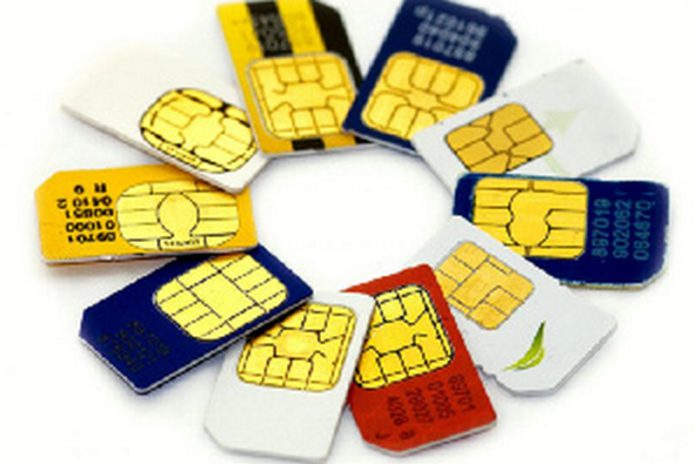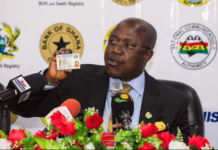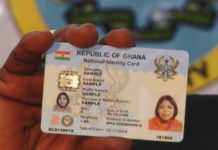
The SIM card re-registration process has slumped into controversy following revelations that the Ghana Cards of some members of the public have been used to register SIM cards that they do not own.
Indeed, some SIM card owners are alarmed that their Ghana Cards have been used on their blind side to register numbers that do not belong to them.
The revelations have come about as the mobile network operators, the Ministry of Communication and Digitalisation and the National Communications Authority (NCA), offered a check route through the short code *402*1# as a security assurance in order not to nullify the essence of the re-registration exercise.
In one instance, a victim, Adwoa Vic, said she could not believe it when she went through the checking process with the short code.
“My card is registered with five unknown numbers aside from mine. I use only one sim card, an MTN number,” she said.
She asked whether subscribers were safe in the country, given the revelations about the virtual theft of people’s Ghana Card details for indiscriminate SIM card registration purposes.
The short code allows persons to cross-check the list of SIM cards registered with their Ghana Card.
The system allows subscribers to request a SIM card to be delinked if they were unaware of the SIM card registered in their name.
“If you identify any unknown mobile number(s) linked to your Ghana Card, request for a delinking of the number(s) from your service provider as soon as possible,” the communication to that effect said.
Observation
Observing some people verify the number of sim cards linked to their Ghana Card, the Daily Graphic realised that while those who completed their sim re-registration at the offices of the moble network operators (MNOs) had no problem with their cards, many of those whose cards were linked to numbers not known to them had completed the two-phase process with some authorised agents.
In the peak of the re-registration exercise, some interventions were rolled out to make the process of registration more accessible and convenient as the offices of the MNOs recorded large crowds of people who wanted to complete the process.
Experiences
In separate interviews with the Daily Graphic, some SIM card owners said they were amazed how their Ghana Cards were used to register other multiple numbers without their consent or knowledge.
A victim, Kwame Kankam, said he was only alerted by his network service provider that he had exceeded the maximum 10 SIM cards registrations permitted by the system.
The message from MTN, dated April 15, 2023, read: “Dear Valued Customer, you have exceeded the maximum of 10 SIMs that can be registered by an individual. Kindly visit the nearest service centre before April 17, 2023, for further assistance as the additional SIMs will be disconnected. Kindly treat as urgent”.
Mr Kankam said he was told at the MTN office that not only were some unknown MTN numbers registered with his Ghana Card, but that several AirteltiGo numbers had been registered in his name as well.
He explained that while it did not take long to delink the eight additional numbers from his Ghana Card at the AirteltiGo office, he had to go back and forth to do same at the MTN office.
He said he suspected his Ghana Card was used by an agent he had transacted business with to register some MTN and AirteltiGo lines he knew nothing about.
“For now they have delinked all the numbers; it is now left with the MTN line,” he said.
Paul Nyonyo, also a victim, said three other additional Vodafone lines he did not own were registered in his name with his Ghana Card.
“I had two Vodafone lines, but when I checked, they had registered three other lines with my card. I went to their office in Cape Coast where I met other people in a long queue with a similar problem. After waiting for my turn, the other three numbers were delinked from my Ghana Card number,” he said.
He said he did not understand how the problem happened since he bought and registered his sim card at a Vodafone office.
Doho Haruna said he detected through the checking process that his Ghana Card had been linked to three numbers.
“I do not own the third number, which is a Vodafone number. I have only one Vodafone line, which I have used for more than a decade,” he said.
Crucial intervention
Another subscriber, De-Graft Aboagye Williamson, however, described the cross-checking initiative as a good intervention, saying “at least, we have made some progress so far”.
He expressed the hope that other challenges would be addressed going forward.
Also, Yaw Adjei, whose card was linked to three numbers he did not know, described the intervention as “crucial as it would save people like him from trouble.”
“I see this Ghana Card identity theft as similar to what happens to ATM card fraud. This intervention is very crucial because some of us will be there and suddenly picked up for a crime we have not committed, but which has our ID linked to that crime.”
Other people who also spoke to the Daily Graphic said that the NCA coming up with such an intervention was indicative of the problem. They expressed the hope that the efforts to clean up the system would also not encounter any subtle impediment from the mobile network operators (MNOs) that may want to hold on for their numbers to look good.
NCA
At a recent news conference, the NCA said SIM registration was a key national assignment fundamental to the country’s digital transformation agenda.
According to the Director-General of the NCA, Joe Anokye, the exercise was critical to build trust and confidence in the use of telecommunications, financial and other essential services, adding that “a reliable SIM register will support security and law enforcement activities to safeguard our common peace and promote socio-economic development”.
Efforts to get the Ghana Chamber of Telecommunications to also indicate what interventions they were putting in place to ensure that the issue was resolved in order not to pose any threat to those who had identified the illegal linkage of their Ghana cards to unknown numbers were unsuccessful.
SIM registration
The SIM card registration exercise in the country began on October 1, 2021.
After an initial six-month deadline, the exercise has been extended a number of times to enable all subscribers to register.
Individuals can register up to 10 SIMs while businesses can register more.
The NCA, at a news conference recently, gave customers of telecommunication networks who were yet to register their SIM cards up to May 31, 2023, to do so or be deactivated.
This is likely to affect some 11,122,295 (30.4 per cent) persons who are unregistered and yet to complete the SIM card registration process to link their phone numbers to the Ghana Card.
The NCA further said it would deactivate and delink SIM cards that had not completed the SIM registration process with the Ghana Card.
As of Wednesday, April 26, 2023, there were 36,571,256 active SIM cards of the various telecommunication networks in the country.
About 6,178,452 SIM cards have since been deactivated and delinked as a result of the failure to complete the SIM registration process.
A total of 25,448,962 (69.6 per cent) persons have completed the two-stage registration process.
ALSO READ:







